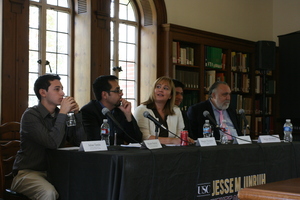Poll shows influence of Latina voters
Latina voters are accessing the Internet and “new media” in increasing numbers, and political campaigns will have to spend more — and speak to a broader set of issues — to reach those voters, expert panelists said Wednesday, in response to a new poll commissioned in partnership by a USC political center.
The poll also found just 41 percent of Spanish-dominant Latina voters have access to the internet, compared to 71 percent of English-dominant ones, and that education and the presence of children at home significantly increased the access to internet in Latina households.

Room for debate · Panelists at Wednesday’s Talk Back lunch discussed the findings of a new poll that examined Latinas’ use of new media. - Nick Muellerleile | Daily Trojan
The poll, conducted by Hispanas Organized for Political Equality in conjunction with the Jesse M. Unruh Institute of Politics, studied California Latinas’ use of new media — defined by access to the Internet and owning an email account — education, language-spoken, participation in community and civic organizations, and even text messaging.
The announcement of the poll’s results was followed by a panel discussion where an array of experts discussed the changes to California’s political landscape and the methods by which future campaigns would have to expand their outlook to court Latino voters.
“It’s important for democracy for every participant in the United States to feel like they have a voice,” said Sergio Bendixen, a panelist and the president of Bendixen & Associates, the multicultural and multiethnic research company that assisted in the poll.
Bendixen explained the key findings in the study: There was a clear relationship between Latinas with children at home and having access to the Internet. The poll also found that as well as being involved politically and civically. Most notably, however, the poll found a great language divide: English-speaking Latinas are more likely to access new media than Spanish-speaking Latinas.
The six members of the Talk Back panel, including students and experts, discussed the poll’s findings.
Bendixen said he thought it was important to reach out to both English-speaking and Spanish-speaking Latinas. He suggested developing websites where people can showcase information important to Latinas.
Bendixen also said he thought it was important for campaigns to reach out to immigrants in addition to Latina voters.
“It’s not only important for the Hispanic community but also for the country,” he said.
Margita Thompson, former press secretary for Gov. Arnold Schwarzenegger, said the growing popularity of new media would give Latinas the opportunity to blog and write about issues important to them.
Helen Torres, executive director of HOPE, explained how the group intends to use the poll results.
“We hope to be conducting briefings with foundations, political campaigns, and legislatures, so they can utilize this information,” she said. “This informs their outreach efforts so it will make them more inclusive, including Latinas.”
Panelists discussed the successes and failures of efforts of past presidential campaigns, like those of George W. Bush, Al Gore, John Kerry, Hillary Clinton and President Barack Obama, in their outreach to Latina communities.
The discussion was an eye-opener for some students, including Alex Jacobs, a junior majoring in public relations. She noted that she is from Utah, a much less diverse place than Los Angeles.
“I probably wouldn’t have done much research on the Latina vote … but it’s good to know if you’re going to represent how they vote, she said.”
Torres said HOPE plans to keep working with USC because it would help inform the student body and faculty about the organization’s work and will continue to assist advocacy efforts in the area.

or maybe…
Just more clarification as to what exactly constitutes Latina.
I think the article means Latino.
Latina = a lady women of color.
If you want to help the latina population, concentrate on teaching them english and helping them to assimilate into American society. Diversity isn’t what makes this nation great, it’s the unity we get by coming together as Americans.” E pluribus unum, from many one.” The US is the melting pot of the world. When one segment doesn’t assimilate, it becomes divisive and in conflict with the rest of the country. It happens in other nations as well. Check out Quebec and the rest of Canada. Several efforts have been made to separate. Could this happen in the US?